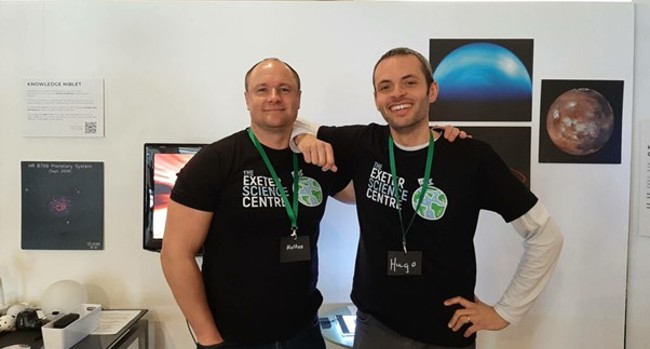Community Partnership Hub - academic case studies
Silver Stories

George Koutsouris of the Graduate School of Education recently collaborated on a research project with the charity Silver Stories. With an Impact Accelerator Award from the ESRC, George and his co-investigators (Tricia Nash and Brahm Norwich) worked with the charity to evaluate the Silver Stories programme, which involved school-age children reading to older people. This programme was seen as a way of tackling social isolation amongst the elderly and reading difficulties in young people, as well as enhancing wellbeing for both groups, but the project ultimately found that its value went beyond that of a more traditional school intervention.
George said, “Working with a charity really helped me to explore ways to communicate my research in a manner that is more relevant and meaningful to those outside the academy. During the project, some of the ways we interpreted the data came from our previous research and our knowledge of broader literature in this area, but many of the insights and key points came from the charity itself – from the people who designed the Silver Stories programme in the first place.”
Tricia agreed that the charity played a crucial role in co-designing the research. “Silver Stories really embraced that and the trustees were surprised at how much we valued their input. It was a real partnership.”
She added, “This was probably the nicest project I’ve been involved in, in all my years of research. This project was really about inclusion, because the older people got so much out of it, and so did the schools, the readers and their families. It was so nice to be able to hear the readers and listeners talking about the impact on their social wellbeing.”
David Carney-Haworth of Silver Stories said, “As a fairly new charity we wanted to be able to explore the far reaching and positive aspects of Silver Stories in addition to exploring possible unknown aspects of our work.
“As soon as we approached the team at Exeter University we were greeted with great enthusiasm and understanding and a commitment to undertake the research. The team were effective and empathetic communicators, with clear expertise in the field of our enquiry, thus enabling us to be guided through the process efficiently and effectively. This was true partnership working.
“This research will now be used by Silver Stories to share with others and to give us a platform for further work.”
The project team are now looking at ways to take this research forwards, and plan to look at whether the Silver Stories programme could be integrated into personal, social, health and economic (PSHE) education in schools, as well as offered as part of NHS social prescribing.
Exeter Science Centre

University of Exeter scientists Hugo Lambert, Nathan Mayne and John Bruun worked closely with Exeter Science Centre to design and deliver a pop-up exhibition, “Breaking the Ice”, held in March 2022. Having been awarded £15,000 in funding from the Science and Technology Facilities Council (STFC), the project team had a unique opportunity to give local people a taste of the future Exeter Science Centre building, whilst presenting the most pressing global issue – climate change – from a new and hopeful perspective: through the lens of STFC exoplanet climate research. Exeter Science Centre worked with the academic team to design the experience for the “Breaking the Ice” pop-up, to come up with ideas for hands-on exhibits, and to produce the online resources. John in particular advised on how the Science Centre could encourage engagement and discussions with the public about climate science.
The project also received the support of around 30 volunteers from the University - students and academic staff, who helped run the exhibition experience as "mediators". This involved being a welcoming presence for visitors, facilitating conversations around the topics covered, explaining the science, and helping us to make sure everything ran smoothly.
Natalie Whitehead, founder and director of the Exeter Science Centre, said:
“The pop-up was such a success because of the incredible contributions of University of Exeter staff and students - in working with us to make the exhibition, and as volunteers who helped with the exhibition experience. We are so grateful for their enthusiasm and dedication. The responses from the public were overwhelmingly positive about having friendly, down-to-Earth scientists to speak to, and we hope this is the start of many more new and impactful collaborations with UoE colleagues.”
Hugo Lambert, associate professor in the Geophysical and Astrophysical Fluid Dynamics group, said:
“The pop-up shop was a fantastic opportunity for the University to show some of our latest research in Earth and exoplanetary science to the public. More importantly, the shop demonstrated the need for somewhere local where everyone can explore and discuss science. We aim to work closely with the Science Centre as they work towards finding a permanent home in Exeter.”
You can experience the “Breaking the Ice” exhibition virtually – including a 360-degree immersive walkthrough and a range of exhibition resources – on the Exeter Science Centre website.
Photo courtesy of Exeter Science Centre.
Healthy Exeter Projects
The Healthy Exeter Panel was a task-and-finish group established to support the delivery of the Exeter Civic University Agreement Mission to Enhance the health and wellbeing of our citizens. This collaborative group, comprising representation from all the major statutory and voluntary sector organisations responsible for the provision of health and wellbeing in Exeter, as well as academics from the University of Exeter, was convened to identify priorities and opportunities for collaboration. A demonstration research project was conducted during the summer of 2022, to test ways of working between the university and local organisations. The projects conducted research in three areas which had been identified as priorities by the Healthy Exeter Panel in order to inform 3 opportunities for more strategic collaboration across the sector:
These three reports presents findings on these three areas:
- Workforce retention in the health and care sector: Final report - Workforce retention review
- Characteristics of frequent attenders and interventions for reducing levels of frequent attendance: FInal report - Frequent attenders review
- Characteristics of “non-attenders”: FInal report - Non attenders review



